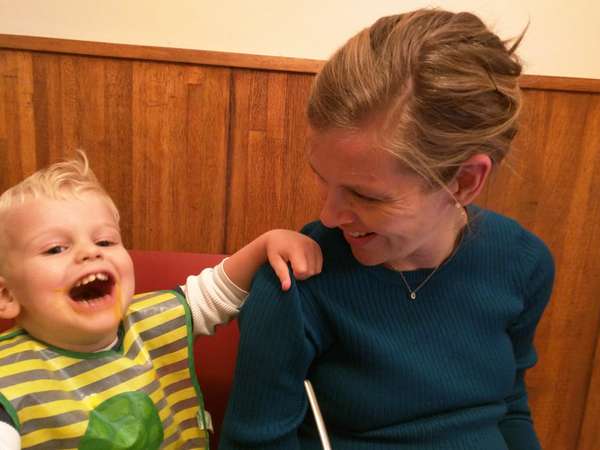Descending the mountain
There are mountaintop moments where joy describes exactly what we’re feeling. The birth of a child is one time. And then, the moment passes. Joy becomes a foreign concept once again.
Joy is a nerdy idea. When you think about this powerful word, it’s in the phrase jump for joy.
- “When my team won …
- “When my boss got fired …
- “When my car started …
… I literally jumped for joy.” It’s only in small, trite moments where we think of using the word joy. Although, if you’re married to a woman named Joy, you might say it a bunch.
Joy is news
Joyful parenting is a growing trend with inspirationally-minded people. It’s based largely on slowing down. Staying positive—even when a positive mindset seems crazy. There’s a goal to set the pace, not just react to it.
Joyful parenting = parenting positivity.
- Celebrating the small moments of parenting
- Enjoying kid chaos with a sense of humor
- In adversity, keeping a blessed perspective
When we slow down, we react differently. Usually, we respond in the way we want to. We’re able to follow our better instincts. A positive outlook is great for our kids, and also for our spouse, our coworkers, that person in traffic, even us.
What does being a joyful parent look like for fathers? Sometimes, fathers see and say things in a unique way. Dads are often less touchy-feely. It can be a hindrance to warm and tender moments. And yet, fathers will often recognize big accomplishments and celebrate their children’s achievements.
If it were easy …
Blogging these days is about showing authority. With a topic like this? I’m no pro at joy. Personally, I find it to be elusive. Joy is not an easy thing just to talk about. At most moments of our lives, joy sounds too good to be true.
Or, is that too kind? Maybe joy is an annoying neighbor. Someone the rest of us think is fake. Is joy a Ned Flanders emotion living next door to our Homer Simpson reality where the familiar feelings live?
Is joy a Ned Flanders emotion?
To our naked ears, joy is a weird word, almost a non-word. Hearing it makes us think, “right, the Christmas greeting card thing.” Maybe we’re frustrated that joy is just a word to us. It isn’t easy to feel.
Taking joy seriously
Some talk about joy as a natural way of living:
Joy is the simplest form of gratitude —Karl Barth
Others talk about joy in more cost-benefit ways. It may explain things better.
Theologian John Piper notes, in a blog post about joy, it’s a feeling that has “competitors.” It isn’t a matter of simply feeling joyful, Piper says. It’s about overcoming (ignoring?) the reasons not to be.
“Joy is real, but only after a lot of work.” It’s the most realistic takeaway I’ve heard. It also explains something I’ve experienced. I follow subjects that aren’t easy. I’ll accept a rock in my proverbial shoe if it takes me somewhere. I want to grow. Growth is nerdy.
If joy is a struggle, then joy could take practice. If you’re interested in feeling more joyful, and you’re a parent, then joyful parenting may be for you. Joyfulness and parenting go hand-in-hand. (Or they can.)
In my own life, authentic joy began in the delivery room.

Our children help us get it
We end up teaching our kids a lot of things. They teach us something first. Their little embryo teaches us patience. Then, we learn the art of rushing to the hospital.
When we see a helpless child emerge into this world, we’re taught the best thing. Joy exists!
At that moment, joy barges in, elbows squared, knocking out of the way whatever else we’ve been dwelling on. I’m bigger and better. Joy kids its competitors aside. It does us a favor. Right away, joy shows us how to relate to our kids—with total love and devotion.
Birth-joy is too big to miss
On delivery day, our joy is abundantly clear. And it’s the best kind of feeling because it’s not for us.
The joy is for her, for him. Or them. We’re free to laugh, to cheer, to give thanks. We know then that joy is real.
And it disappears?
No, it can’t be.
… and too easy to forget
The birth moment does disappear, pretty quickly. The bay needs to be weighted. He has jaundice. She might need a procedure. Or, time just slips by, the mountaintop leading to a walk down the other side.
Do we get the joy back?
It’s always available, I’m sure. We may feel it daily. Or not so often. At our kid’s milestones, we do. The first steps. The first word. The first birthday. First day of school. Joy probably barges back in. We let it.
Joy is practice.
How are we doing?
Are the milestones in our families frequent enough to serve as reminders—we’re blessed to be parents? To have amazing children?
Joyful parents want to encourage joy in themselves, in their families, and even in others around them. If joy is hard to come by, joyful parents want to find a way to feel it easier. To make allowances for it. Even sacrifices. Would I be willing to give up something to be more joyful?
Our children deserve our joy. We deserve to feel it as well. The regular emotions—happy, proud, satisfied, pleased—they’re all great feelings in and of themselves. Joy is better.
What it’s worth (my 2 cents)
Joy is a higher feeling, I think because it references something else. Outside of us. We feel joy over a child. The feeling is a reflection of a relationship. We share joy and receive it. It’s a back and forth.
People feel joy over nature. Others, over their Creator. Even the joy over a sports team win, or a political victory, lifts us above our own limited lives. Genuine joy can be found in a lot of places.
I can experience the daily emotions mentioned above all by myself. But I know of joy because of my children. To teach joy, you have to know it yourself. My kids put me on the right track to find it. And to give it back to them.

Can you be a joyful parent?
Joy is an interesting experiment for the modern person. We have a lot going on. Joy is like the lifting of emotional weights or an hour of cardio. It may feel like work. Hopefully, the reward is worth the effort.
We see a lot of smiling people online. Only, we don’t mistake smiling for joy. Sometimes, we see a picture of ourselves smiling and ask ourselves, “That’s me? I really should smile more.” Smiling is a start.
We can look back at pictures of us in the delivery room. We were smiling that day. It wasn’t a forced smile for social reasons. It was genuine. It reminds us today, joy is possible.
All photos © Eugene Havens
This post first appeared at The Joyful Father.





